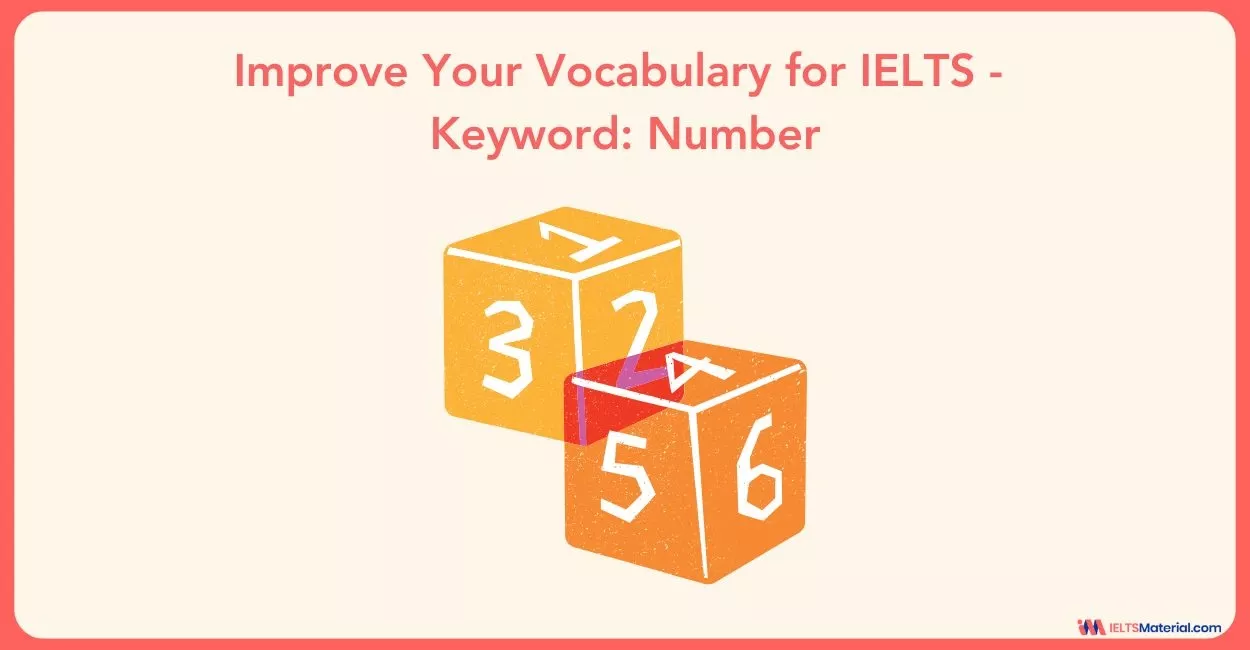Improve Your Vocabulary for IELTS - Keyword: Number
5 min read
Updated On
-
Copy link
Excited to learn all about this article on “Improve your Vocabulary for IELTS - Keyword: Number” Get set to practice our quick practice exercises to enhance your lexical resource band score now!
Table of Contents

Limited-Time Offer : Access a FREE 10-Day IELTS Study Plan!
When you are preparing for the IELTS test, as a test-taker you must focus mainly on the grammar and structure of a sentence, but also must not overlook the importance of natural vocabulary usage like this key word, ‘number.’
In order to score well in the lexical resources part, you must clearly showcase that you can use a wide range of vocabulary perfectly. One of the most powerful ways to achieve it is by learning collocations with the key academic words.
This word “number” is a perfect example since it is used in various contexts, from math and economics like, “huge number of customers” to society topics like, “the total number of candidates applied for” and even in certain personal situations for instance, “I want to take her number sometime.”
Buckle up to grab your desired IELTS band score in no time! FREE Demo!
Practice Exercise: Keyword - Number
When one is able to use phrases like “higher numbers,” or “making good numbers,” will enhance your IELTS Speaking and Writing responses. The examiners tend to specifically notice when you use natural expressions, and the collocations of “number” may instantly make your ideas clearer and more impactful.
Hence in this article we will highlight the most important exercises based on this key word “number” you must know and showcase how to use them in an IELTS setting effectively.
1 Number + of + noun
Use these nouns in the sentences below:
advantages factors changes occasions
problems reasons times ways
- Yes, I know George Robertson. We’ve met on a number of _______________ .
- I decided not to go to the party for a number of ____________ that I’d rather not talk about.
- A significant number of____________ have taken place since I was at Oxford.
- Stop worrying. You can only be infected with HIV in a limited number of __________ and shaking someone’s hand isn’t one of them!
- There are a number of____________ that could account for the differences between the scores.
- A number of unforeseen____________ have arisen and we’ve had to postpone the concert.
- I’ve lost track of the number of____________ Tony has asked me to lend him money.
- Studying English in Britain has a number of distinct____________ . You can’t escape it! It’s everywhere!
2 Adjective + number of + noun
Use these adjective / noun pairs in the sentences:
| appalling / casualties
total / votes huge / convictions high / accidents |
alarming / complaints
increasing / cases limited / places record / replies |
- The __________ number of__________ in the First World War was due partly to incompetent officers.
- The advertisement we placed in last week’s paper has attracted a __________ number of ________ .
- The tour company is investigating the __________ number of__________ made against one of its hotels.
- There’s been an__________ number of__________ of measles among young children.
- He’s a known criminal. He has a __________ number of previous __________ for theft.
- This latest result brings the__________ number of __________ for the Socialists to over twenty million.
- We have a__________ number of free__________ on the course.
- There’s a very __________ number of __________ at this junction.
3 Verb collocations
Use the correct form of these verbs:
- More and more young people are going on to higher education. The number has __________ tenfold over the past decade. (reached / risen)
- The government has launched a new road safety campaign in an attempt to__________ the number of deaths on the road. (cut / chop)
- The hospital__________ the number of visitors a patient can have. Only two people are allowed in at one time. (reduced / put down)
- The number of visitors to Stonehenge could soon __________ saturation point. The authorities will have to start turning people away. (reach / come to)
- The number of people out of work in the town has __________ from 5000 last year to 3500. (reduced / fallen)
4 Common adjective collocations
Complete the sentences below with the following:
disproportionate huge wrong
maximum unlucky exact
- A lot of people believe that thirteen is an__________ number.
- _________ numbers of cattle have had to be slaughtered following the outbreak of foot and mouth disease.
- The__________ number of people killed in the train crash is not yet known.
- Sorry, I must have dialled the__________ number.
- There’s a__________ number of men compared to women in the government. Something must be done to redress the balance.
- There were over twenty people in the lift – five more than the__________ number allowed.
|
Note 1. Note the following expressions: a sharp increase in the number of women who smoke a dramatic decrease in the number of cats in the area Teachers are leaving in increasing numbers. Complaints were surprisingly few in number. 2. ‘Odd numbers’ are 1,3, 5, 7 etc and ‘even numbers’ are 2,4, 6, 8 etc. |
Answer Key: Keyword - Number
Ex 1:
- occasions 2. reasons 3. changes 4. ways 5. factors 6. problems 7. times 8. advantages
Ex 2:
- appalling / casualties
- record / replies
- alarming / complaints
- increasing / cases
- huge / convictions
- total / votes
- limited / places
- high / accidents
Ex 3:
- risen 2. cut 3. has reduced 4. reach 5.fallen
Ex 4:
- unlucky 2. Huge 3. exact 4. wrong 5. disproportionate 6. maximum
Also check :

Start Preparing for IELTS: Get Your 10-Day Study Plan Today!
Recent Articles

Nitika Gupt

Nehasri Ravishenbagam

Nehasri Ravishenbagam





Post your Comments